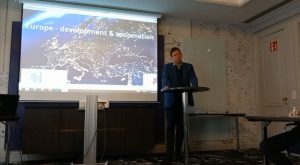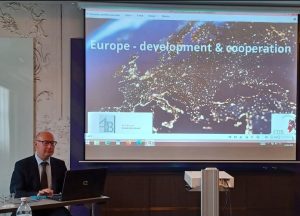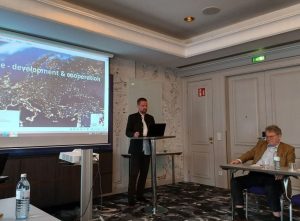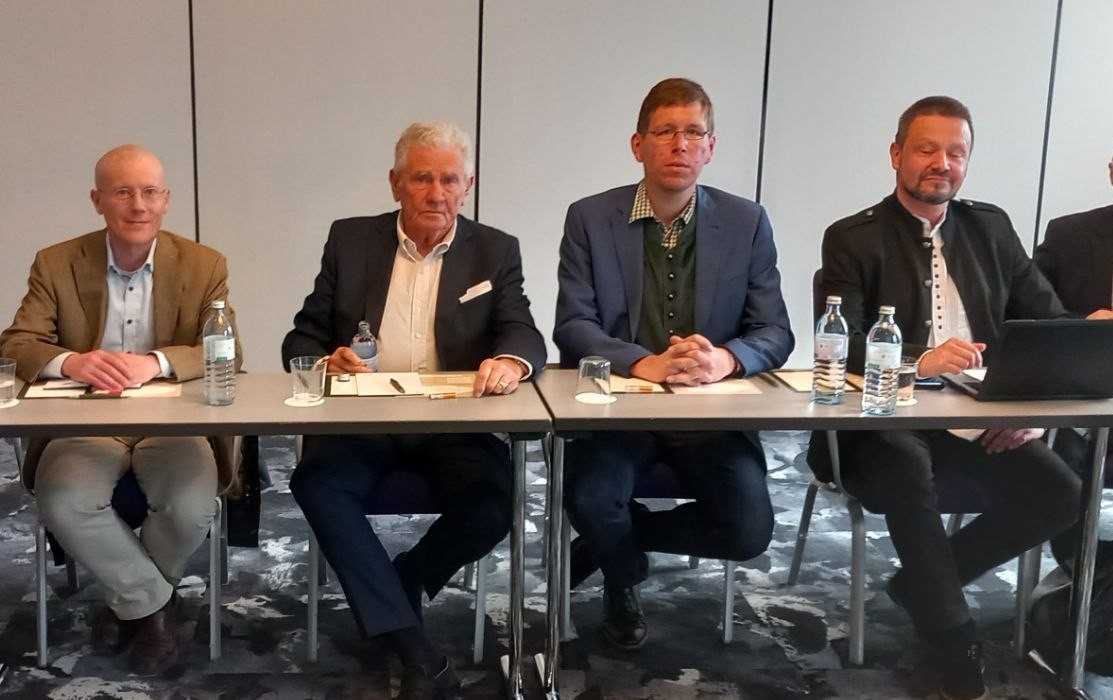As part of the project “The Future of Europe is in Our Hands”, an International Conference entitled “Europe without Wars and Sanctions – A New Economy in a Peaceful Europe” was held in Vienna on 24 April. This event was organized on the basis of the cooperation of the Vienna Academic Society, the political magazine „Zur Zeit“ and the Austrian branch of the Center for Geostrategic Studies.
The main goal of the conference was an open discussion on European security and economic problems and ways to solve them through dialogue and cooperation, as well as on the possibilities of redefining relations with the great powers from the perspective of Europe’s own interests.
„The current situation indicates that Europe is losing its strategic initiative on the international stage, especially in light of the ongoing negotiations between the US and Russia on resolving the crisis in relations between these two powers. In addition, there is an obvious need to stop the deindustrialization of Europe and launch new economic projects, as well as to improve security,“ said Patrick Poppel, a representative of the Center for Geostrategic Studies in Austria. He believes that Europe needs to abandon the policy of sanctions that have caused enormous damage to the European economy and that it is necessary to initiate diplomatic activities aimed at improving relations, primarily with Russia.

Andreas Mölzer, owner of the political weekly newspaper “Zur Zeit” and a Freedom Party of Austria (FPÖ) MEP of the 6th and 7th parliamentary term of the European Parliament, spoke in his opening speech about the challenges facing Europe in times of global change. He emphasized that the EU was created after two world wars on the ideas of freedom, peace and prosperity. “The most important idea for a united Europe was, first and foremost, peace, based on democracy and free will for all the peoples living in it. That was the greatest appeal of this idea. However, all the promises have been broken,” emphasized Mr. Mölzer. He believes that the EU is encouraging aggression against Russia with its rhetoric and that this is not in line with the proclaimed idea of peace. In addition, Mr. Mölzer believes that Europe has abolished freedom for its citizens by accepting various radical ideas such as political correctness, woke, genderism, feminism and the like. „US Vice President J.D. Vance rightly condemned such phenomena in Europe, which, along with the mainstream media, are most responsible for the abolition of freedoms. When we talk about prosperity as the third most important factor, Europe is today in a serious recession, economic decline and the process of de-industrialization. Prosperity, as we can see from real indicators, no longer exists,“ Mr. Mölzer emphasized. He pointed out that Europe is in a very bad position because it does not have good relations with any of the major powers. „Unfortunately, many leading European politicians such as Macron, Starmer or Scholz favor war against Russia, but there are other examples such as Meloni from Italy or Orban from Hungary who show that it is possible to have a dialogue with both Russia and the US. The European perspective, economically, militarily and politically, looks very bleak. I have six children and let’s wish them all the best possible,“ concluded Mr. Mölzer.
Dragana Trifković, Director General of the Center for Geostrategic Studies from Serbia, addressed the gathering remotely, as Austrian authorities did not allow her to enter the country. She informed the conference participants that she was forcibly deported from Vienna airport to Belgrade because her name was on the Schengen Information System list of persons who are banned from entering the Schengen zone for three years. “I was informed about this by the Austrian border police upon my arrival in Vienna. According to their claims, my name was added to the list at the request of Greece, but they could not provide me with information about the motives and reasons behind it,” Trifković noted. „The situation I found myself in is very similar to the one described in Kafka’s novel The Prosecution, when Josef is informed that he has been arrested, but they did not know why.
In any case, I have yet to clarify with the representatives of the Austrian and Greek authorities what this is about, but what I have experienced so far tells me that „there is something behind the throne that is greater than the king himself“, as Shakespeare would say. One gets the impression that some invisible hand that knows the architecture of the EU very well, is pulling the strings that create misunderstandings, conflicts and problems. And I am more than sure that this mysterious force does not want peace in Europe“, Trifković pointed out.
Regarding the conference topic, Trifković noted that „The issue of European security cannot exclude the geographical connection of the Eurasian continent and relies exclusively on the transatlantic factor. Especially not in the newly emerging circumstances when American interests are increasingly moving away from European ones. Otherwise, the continuation of the current policy may lead to the spread of military conflicts on the European continent, which is militarily unprepared for such a development. From an economic point of view, the lack of natural resources and the reduction of production in European countries are very poorly coordinated with the policy of imposing sanctions, which exacerbates the problems. One gets the impression that the political elites of the establishment in Europe have excessive self-confidence that prevents them from perceiving these dangers. For this reason, I believe that the open discussion we are having today is more than necessary, and no matter how insufficient our efforts may seem, I sincerely believe that „They are the ones who can spark new ideas and new energy,“ concluded Trifković.
Thomas Bachheimer, a financial and economic expert from Austria, spoke about the economic situation in Europe and its (un)preparedness for the newly emerging geopolitical circumstances in the context of monetary policy: „The question arises whether Europe is prepared for the challenges of the future with its gold reserves in a time of global transformation. Geopolitical circumstances have changed drastically since the US and Russia showed their willingness to change their approach to cooperation, and perhaps even to become strategically closer around the adoption of a „new gold standard“. Europe has thus found itself diplomatically dependent, energetically insecure and monetarily unstable. Europe’s gold reserves are impressive but immobile. Europe has 11,800 T of gold, more than any other political bloc, even more than the US. Is that enough to stay in the game in this high-stakes geopolitical finale?” Bachheimer asked.
He continued his speech by noting that “Much of this gold is politically non-indebted, monetarily neutralized and still stored in New York, in London, in yesterday’s world. While others are hoarding gold as a strategic asset, Europe remains stuck in the technocratic power of the ECB. On the other hand, the BRICS countries are buying at record levels, signing trade agreements, preparing a new currency system. And while Beijing and Moscow treat gold as a cornerstone of sovereignty, Paris and Berlin must, if we generalize, control reserves. Europe has enough gold, but at the same time, the leadership of so-called Western Europe has neither the knowledge, nor the moral, nor the financial condition to prepare for a monetary future that no longer serves politics and the financial industry, but serves the people, entrepreneurs, taxpayers and all other economic actors,“ Bachheimer concluded.
Stefano Vernole, Vice President of the The Mediterranean Eurasia Study Center (CeSEM) from Italy, spoke on the topic: „The economic consequences of sanctions against Russia and the deterioration of the living standards of European peoples due to their participation in the conflict in Ukraine. The consequences of the relocation of European companies to the USA.“ He pointed out that “the United States not only did not approve of the implementation of the EU’s strategic autonomy, but also actively sought opportunities to disrupt EU-Russia energy cooperation. In recent years, the United States has sold shale oil and gas to the EU under the pretext of “strengthening Europe’s energy security” that has been jeopardized by wrong geopolitical choices.” Vernole noted. Vernole described the geopolitical aspects of energy cooperation through specific examples: “Orders for US liquefied natural gas (LNG) are settled in dollars instead of euros, which strongly affects the international status of the single European currency. In order to balance the de-dollarization initiated by Eurasian countries, the US is forcing the Atlantic bloc countries to increase their purchases of US government bonds and the use of dollars in trade.

Donald Trump is trying to make a deal with Moscow to buy Russian oil precisely so that he can be paid in dollars. If the new US president were to secure the rights to Nord Stream, Washington would then resell us Russian gas at a significantly increased price, exacerbating the already existing inequality in production costs,” Vernole noted. In the concluding part, he analyzed what prospects are possible: “In a multipolar world, dependence on the United States is no longer feasible. Instead of adopting a strategy of oscillation to encourage external powers to cooperate amicably, Europe has permanently tied itself to one region (the transatlantic). However, a re-established Europe could integrate into the Eurasian project: Russia, Brazil, the UAE, Saudi Arabia and Turkey are all major energy producers or strategic hubs and possess the basic materials necessary for the energy transition. In the meantime, the only possible option for survival is to seek diplomacy,” Vernole emphasized.” Vernole emphasized.
Christian Zeitz, a member of the Board of Directors of the Vienna Academic Society from Austria and Director of the Institute for Applied Political Economy, analyzed primarily the economic situation and prospects. He listed four key challenges for Europe:
- Reform of the monetary system. Separation from the dollar. Creation of national currencies.
- Creation of new economic areas (Ukraine and Russia should be integrated in the future)
- The beginning of reindustrialization and the fight against fanatical climate ideology
- Development of agriculture at the national level and promotion of economic independence
Mr. Zeitz believes that these are key moves that are necessary in order to transform the current European system for integration in the newly emerging geopolitical circumstances that lead to the creation of a different world system.
Konrad Rekas, an economist and journalist, associate of the Center for Geostrategic Studies from Poland, spoke on the topic: „Ukrainian Migration in Europe, Crises and Conflicts“. At the beginning of his speech, he spoke about the energy crisis and the crisis of rising living costs as a result of the forced abandonment of a cheap and accessible source of energy in the form of Russian natural gas: “In fact, everything that is happening to our gas and electricity bills is the result of a deliberate policy of inciting the crisis, justified by war, moral sanctions against Russia and similar ideological slogans, while we are engaged in vulgar speculation, which, for example, takes place on the EU ETS (EU Emissions Trading System) market. The destruction of the German energy transition project (Energiewende), imperfect, based on the wrong assumptions of climate propaganda, but nevertheless important for the whole of Central Europe, was no less an act of political terrorism than the blowing up of Nord Stream 2 was a clear example of armed terrorism!”, Rekas pointed out.
Continuing his speech, he analyzed the situation in Poland, burdened by a large influx of Ukrainian refugees: “Since February 2022, at least about 9 million people have arrived from Ukraine via Poland, of which about 6 million are still within the EU (over half in Poland). The rest circulate back and forth many times, practicing a kind of tourism with social benefits, generously given by other countries,” Rekas stated.
As a solution, he believes that: “Only a Europe without wars and sanctions, but with well-guarded borders and a rational economic policy based on mutually beneficial cooperation, especially in the field of energy, can put an end to negative phenomena. Economic crises and conflicts, internal and international, are needed only by those who want to divide us, preventing truly large-scale projects from Lisbon to Vladivostok and further to Beijing,” Rekas concluded.

General Dimitar Shivikov, a former commander of paratroopers from Bulgaria, expressed concern about the future of Europe in his speech: “The bottom line is that after three years of war in Ukraine, Russia is achieving its goals and making progress on all fronts. Of course, after the arrival of President Trump, great changes have occurred in the world, especially in Europe and in Ukraine. He froze aid to Ukraine and demanded a review of billions of dollars spent. He asked European partners to take responsibility and drastically increase defense spending. Europe is currently at a great loss,” said General Shivikov. He believes that Europe has “shot itself in the foot with sanctions” and that the economic situation is very worrying. “Europe is at a very low point in terms of politics, economics and especially energy, and I see no chance of it becoming a geopolitical factor again soon. Proof of this is that Trump does not mention Europe in his statement in resolving the conflict,” General Shivikov pointed out. On the topic of security in Europe, he added: „With the new rearmament initiative, Europe is destroying itself. Europe could not find salvation in the so-called war economy. It will be a broken raft that will finally bring Europe to the bottom, if it comes to that. Because Europe does not have the capacity to carry out such a military transformation that would make it equal to the USA or even Russia. If Europe goes down this path of rearmament, it will be completely buried.“ In conclusion of his speech, General Shivikov stated that „Europe can only be strong if there are different options, if there are arguments, even fierce ones. For example, most members of the European Parliament are like machines, which are programmed, and at any moment you know what they will say, which resolution they will support and whom they will punish. If Europe wants to be reborn, it must return to the model of freedom, because there is no place more devoid of pluralism than the European Parliament,“ concluded General Shivikov.
Some of the conclusions of the conference during the discussions were that it is necessary to continue the open discussion within the European framework, but unfortunately the atmosphere in Europe is very unfavourable due to the suppression of freedom of speech and censorship.
Also that the sanctions policy was completely wrong and that it led to unpredictable consequences for the European economy. It is necessary to discuss the lifting of sanctions and the launch of new economic projects. The solution to the energy crisis in the EU should lead to a fair investigation into the terrorist attack on Nord Stream, as well as to the urgent restoration of oil and gas supplies to Europe through the Baltics and Ukraine and the removal of obstacles to energy cooperation with Russia. The solution to the energy crisis in the EU is impossible without Russia.
European security is possible only in combination with security and peace in the entire Eurasian space. It is necessary to achieve a peaceful resolution of the conflict, taking into account the position of Russia and its legitimate demands for the protection of national security. Unfortunately, despite the statements about the need for peace, many European countries and Ukraine are not really interested in it.
The sanctions policy has failed, the EU sanctions against Russia must be lifted. The conference recorded the fact of the decline in the standard of living of the average European due to anti-Russian sanctions, military appropriations, business migration to the United States and support for Ukrainian agriculture and Ukrainian migrants. The conference in Vienna demanded the lifting of sanctions against Russia, the beginning of the construction of European business from scratch on the principles of equality, mutual respect and good neighborliness.
Source: Center for Geostrategic Studies

